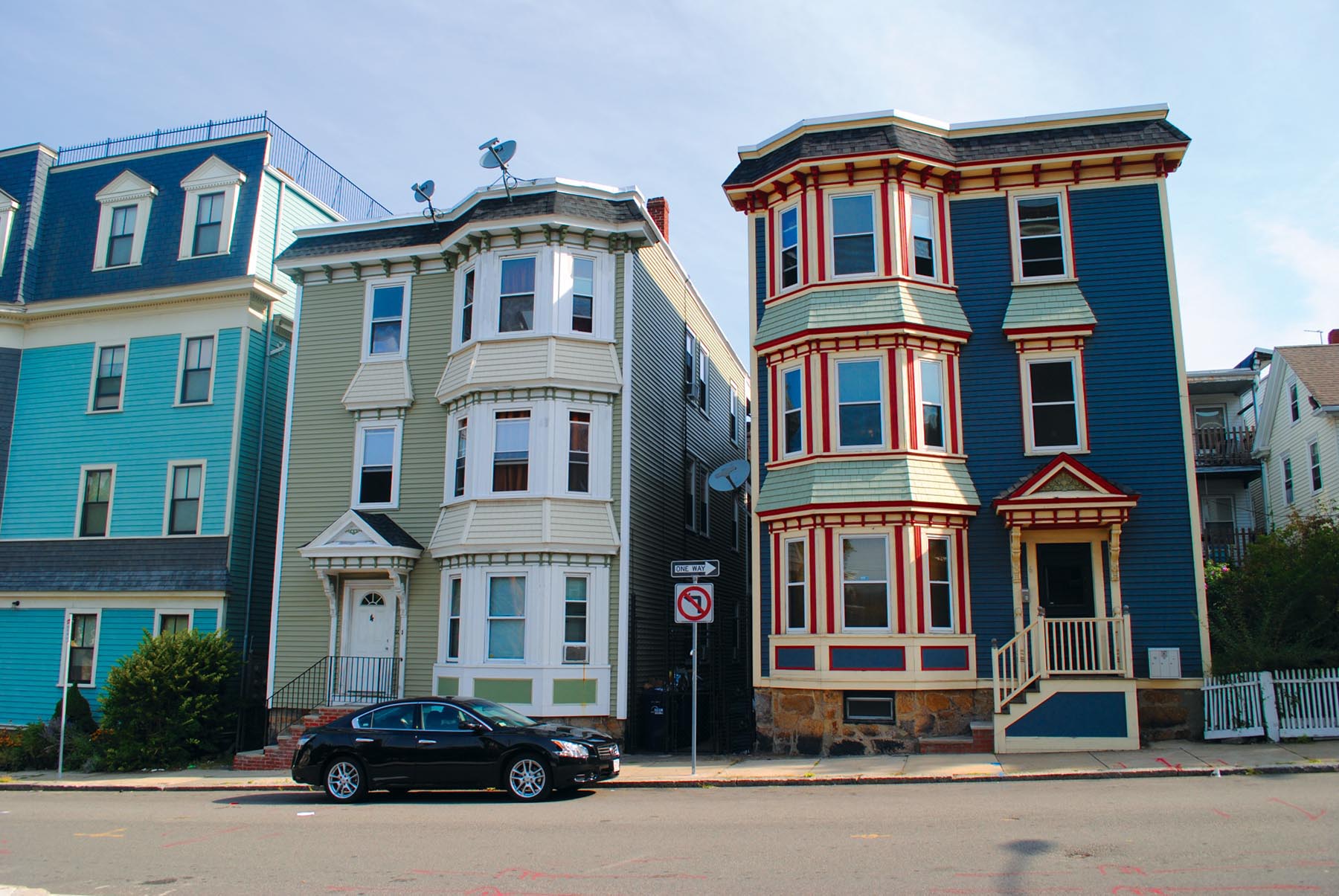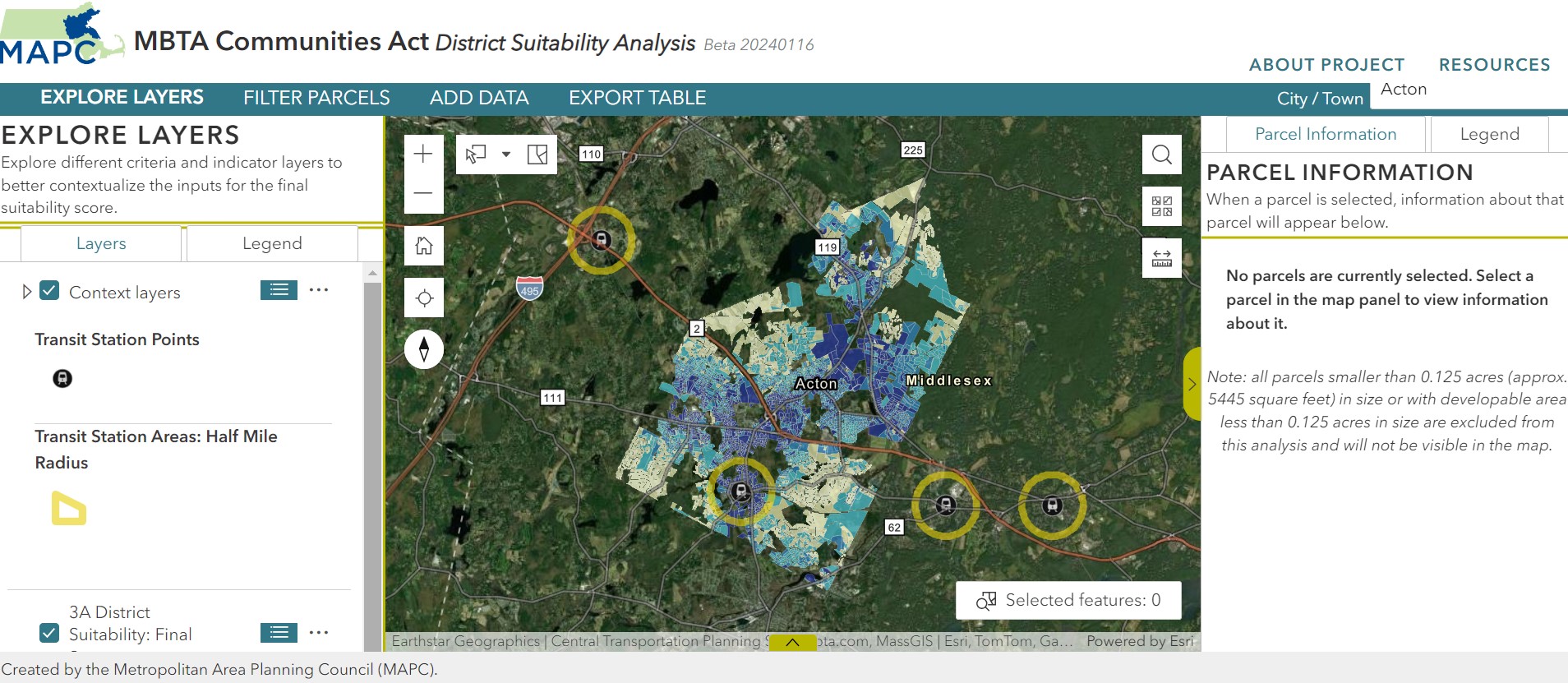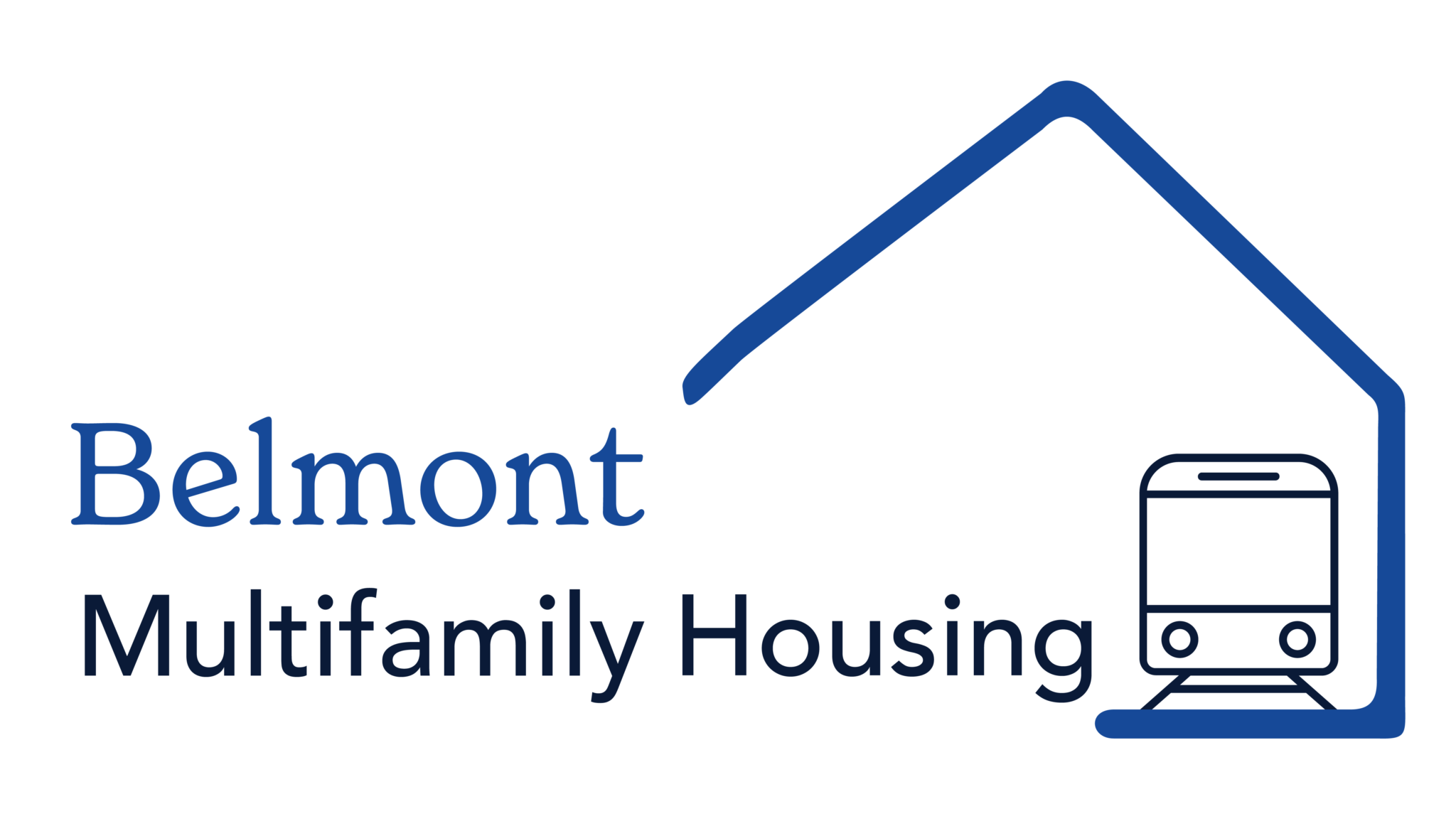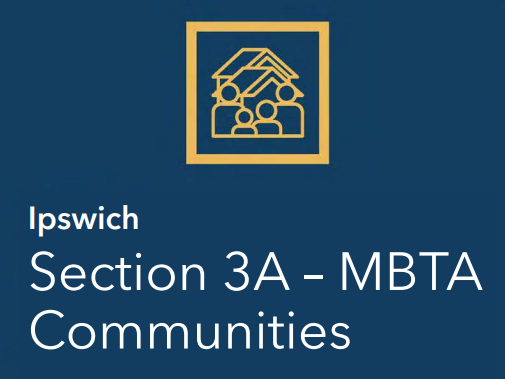MBTA Communities Multifamily Zoning Requirement
(Section 3A)

In January 2021, the Massachusetts Legislature adopted an Economic Development Bond Bill (H5250) that made long-overdue changes to the state’s Zoning Act (MGL Chapter 40A). The “Housing Choices” sections of the bill made it easier for municipalities to adopt pro-housing zoning changes, discourage meritless anti-housing lawsuits, and require each of the 177 communities in the MBTA service district to zone for multifamily housing by right near transit and other smart growth locations.
The law created a new section of the Zoning Act—Section 3A—and authorized the Executive Office of Housing & Livable Communities (EOHLC) to develop guidelines for implementation of the requirements. It requires all MBTA Communities to have at least one zoning district of reasonable size that allows multifamily housing development without a discretionary permitting process.
As an organization committed to advancing smart growth, MAPC strongly supports Section 3A. We feel that all MBTA communities should contribute to the production of new housing and that areas with safe and convenient transit access are especially appropriate for multifamily housing. Section 3A also aligns with several recommendations of our regional plan, MetroCommon 2050, including:
- Inclusive Growth and Mobility – Reduce vehicle miles traveled and the need for single-occupant vehicle travel through increased development in transit-oriented areas and walkable centers.
- Homes for Everyone – Accelerate the production of diverse housing types throughout the region, particularly deed-restricted Affordable Housing, with a focus on transit-oriented, climate resilient and other smart growth locations.
This webpage is a resource for local leaders, municipal staff, and members of the public looking to understand Section 3A, learn how communities in the MAPC region are preparing for compliance, access digital tools that can encourage smart planning decisions, and more.
Questions? Contact:
- Emma Battaglia, Senior Housing and Land Use Planner
- Andrea Harris-Long, Director of Land Use
Stay in the Know
Subscribe to MAPC's Section 3A email list to stay updated on new tools and resources as they become available, and much more.
How is MAPC helping communities prepare for Section 3A compliance?
- Compliance Application Submission Support
- Visioning and location selection
- Community engagement
- Analyzing existing zoning for compliance
- Crafting zoning scenarios that could achieve compliance
- Compliance model testing
- Creating 3D visualizations and illustrations of zoning scenarios
- Preparing economic feasibility analyses (EFAs) for inclusionary zoning policies
- Town Meeting preparation (show your support trainings, for example)
- Developing digital tools to inform decision-making
MBTA Communities Show Your Support Toolkit
MAPC has launched the MBTA Communities Show Your Support Toolkit: Tools for a Successful Adoption. This toolkit aims to empower municipal stakeholders and housing advocates as they educate community members about the MBTA Communities Law and its role in helping to solve Massachusetts’ housing crisis. The toolkit includes the following:
- Messaging Guide: Provides an overview of the MBTA Communities Law, why it was passed, and how it can help municipalities. It offers ways to discuss Section 3A through a variety of different lenses depending on community priorities.
- Community Outreach Planning: Provides an overview of the steps to a successful engagement process, including connecting with stakeholders, holding effective meetings and conversations, and creating a robust local adoption process that brings in a diverse range of voters who may not have been involved in past municipal processes.
- Navigating Town Meeting: Describes the Open Town Meeting and Representative Town Meeting processes in Massachusetts and suggests tips for success that municipal staff and advocates can use.
- Downloadable Materials: Contains informational fliers and a template presentation for a Show Your Support Training that can be utilized in local adoption outreach. Materials are included as PowerPoint files so they can be easily customized for different localities.
District Suitability Analysis Tool
MAPC’s Section 3A District Suitability Analysis Tool is a decision-support tool that uses data to help municipalities identify or assess locations for 3A zoning districts that advance regional and local goals. The tool evaluates locations based on a set of criteria related to transportation, accessibility, development feasibility, residential capacity, and climate vulnerability, scoring each land parcel from 0 (least suitable) to 100 (most suitable). Clusters of parcels/sites with higher scores are strong candidates for 3A zoning districts.
In addition to identifying and assessing locations for 3A districts, municipalities can also utilize the District Suitability Analysis Tool to assess development potential both within these zoning districts and elsewhere in the community.
Click the links below to access and learn more about the interactive online map tool, and see what areas emerge as the most suitable in your community:
- Interactive online map tool
- One-page explainer
- District Suitability Explainer
(provides an overview of the purpose and inputs of the analysis) - Using the Tool
(provides information about how the tool can be used to define a 3A district) - Appendix A: What is a Suitability Analysis
- Appendix B: Technical Documentation

Webinar: Planning for Section 3A Success: Leveraging the District Suitability Analysis Tool
On Tuesday, February 27, 2024, MAPC hosted an informational webinar about the District Suitability Analysis Tool.
View the Presentation Slides
Webinar Q&A
MAPC Led 3A Projects with Communities
MAPC is working with several communities in our region to plan for Section 3A compliance, often in the context of a larger neighborhood or community-wide visioning process. Click the buttons below to explore some of these projects:




Rapid Transit Community Cohort
In 2023, MAPC convened the Rapid Transit Community (RTC) Cohort, consisting of Braintree, Brookline, Cambridge, Chelsea, Everett, Malden, Medford, Milton, Newton, Quincy, Revere, and Somerville. The overarching objective of this technical assistance initiative was to facilitate a comprehensive understanding among the 12 RTC municipalities regarding the alignment of their current zoning regulations with Section 3A requirements. Furthermore, it provided technical support to understand the implications of various zoning elements on compliance while providing insights into potential routes for achieving compliance, ultimately positioning municipalities for public engagement with respect to zoning alternatives. This cohort model also served as a platform for mutual learning and support.
Thanks to support from the Massachusetts Housing Partnership (MHP), MAPC was equipped to offer crucial technical assistance, including compliance testing, zoning assessments, economic feasibility analyses, and support for community engagement, among other services. These resources are essential to aid RTCs in meeting the compliance deadline of December 31, 2023. To date, MAPC has either completed or is currently engaged in various analyses for the municipalities of Brookline, Everett, Medford, Milton, Newton, Revere, and Somerville.
Technical Assistance to Support 3A Work
Technical assistance is available through a variety of state and regional programs. Cities and towns are encouraged to explore the resources available to support elements of 3A compliance.
Resources and Relevant Links
EOHLC Resources
- Compliance Status Spreadsheet as of 1-31-24
- EOHLC’s MBTA Communities Webpage
- Section 3A Compliance Guidelines
- Compliance Model & Components
- Compliance Model User Guide
- Economic Feasibility Analysis (EFA) Materials
- Mixed-Use District Location Determination Form
- Pre-Adoption Review Application Form
- District Compliance Application Form
Office of the Attorney General Resources
MAPC Resources
- How MAPC can help your municipality comply with Section 3A
- MAPC’s work developing 3A-compliant zoning in Acton
- MAPC’s work with the Rapid Transit Community Cohort
- MAPC’s work on Economic Feasibility Analyses (EFAs)
- Example Economic Feasibility Analysis – Everett
- Update on Housing Production's Affect on Public School Enrollment
- Zoning for Livable Communities: MBTA Communities Law as a Catalyst for Municipal Opportunity
- This report is a joint project between MAPC and students from Tufts University Graduate School of Arts and Science Urban and Environmental Policy and Planning
Section 3A in the News
Section 3A, and the housing shortage in general, has been a hot topic in the news. Click the links below to read some of the stories from The Boston Globe and other local news outlets:
2023
“What the MBTA Communities law means for your town” – CommonWealth Beacon, January 2, 2023
Most towns are going along with the state’s new multifamily housing law. – The Boston Globe, February 14, 2023
“AG threatens legal action against towns that won’t build denser housing near MBTA stations” – Boston.com, March 15, 2023
“A Massachusetts town leads a way out of the housing crisis” – The New Yorker, April 13, 2023
State to Allow Mixed-Use in Transit Zoning, Adds Penalties for Snubs – Banker & Tradesman, August 17, 2023
Advocates say MBTA Communities Act will provide relief to Mass. housing crisis – Wicked Local, October 10, 2023
“After tense debate, Arlington adopts new housing plan” - The Boston Globe, October 26, 2023
“Somerville learns to love the triple-decker, again” – The Boston Globe, December 11, 2023
“Salem one of first to comply with MBTA housing law” – The Salem News, December 13, 2023
“New transit-oriented housing law has yet to produce much new housing in Boston’s suburbs” – StreetsblogMASS, December 14, 2023
2024
“Massachusetts is attempting to dig out of a massive housing crisis. The state’s top lawyer wants to help.” – The Boston Globe, February 2, 2024
“In Milton, a critical vote to help ease the housing crisis” – The Boston Globe, February 4, 2024
“Commentary: This is a big year for the seaport” – Gloucester Daily Times, February 9, 2024
“Editorial: Navigating housing changes responsibly” - Marblehead Current, February 21, 2024
“Some Suburbs Roll Out YIMBY Welcome Mats” - Banker & Tradesman, March 17, 2024
“Full SJC to hear Milton rezoning case” - CommonWealth Beacon, March 18, 2024
“Housing is the high-stakes struggle Mass. can’t lose” - The Boston Globe, April 1, 2024
“MBTA Communities panel splits over state vs. local control” - CommonWealth Beacon, April 8, 2024
“In Lexington, the state’s housing law is on track to produce nearly 1,000 new homes” – The Boston Globe, December 3, 2024
Frequently Asked Questions
General Questions
Technical Questions
Guiding Development
Location and Size
Land Use
Access and Affordability
Compliance
